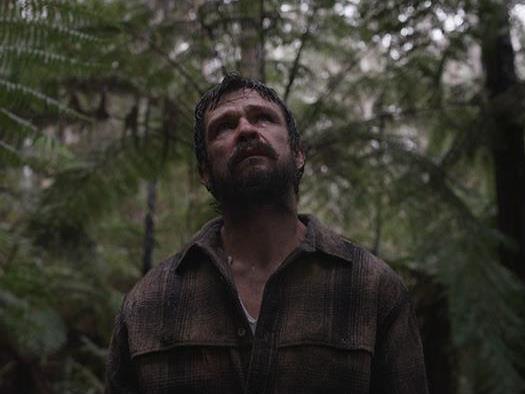Trees tower over Kasimir Burgess’ Fell – both their absence, and their presence. In stillness and silence, the film’s first two shots demonstrate each extreme, first showing the desolation that marks a wooded landscape culled by clearing, then peering into the abundance that results when plant life is allowed to proliferate untamed. Soon, people emerge, a man and a child dwarfed by and marvelling at the greenery of their surroundings. Another juxtaposition is then thrust on the screen, that of men marking up and chopping down the timberland, then transporting the lumber out of sight for other means.
There may be no more blatant a metaphor in a movie than the correlation between nature and humanity in Fell; however thematic subtlety isn’t the intention of debut feature director Burgess, nor of fellow first-time writer Natasha Pincus. Amid the lingering, lyrical shots of foliage, forestry, wandering wildlife and diffuse flecks of light and shade, their plot is deceptively simple, telling of loss, grief, revenge and acceptance. Though initially steeped in dramatic contrivance that pits good against evil, their film becomes an affecting exercise in comparing and contrasting, as predicated on placing the intimate plight of two men linked by tragedy within a broader existential context.
‘Dad, why do leaves fall?’ young Lara (newcomer Isabella Garwoli) asks Thomas (Matt Nable, Riddick) as they enjoy a secluded camping trip in remote Victoria, his answer on the changing ways of life getting to the heart of Fell’s essence. The following day, Lara’s fascination sees her wander through the woods and into the path of a truck shipping felled logs, driven by father-to-be Luke (Daniel Henshall, These Final Hours), who swiftly flees the scene as typical in a hit-and-run. Attempts to overcome the incident prove expectedly futile, with Thomas retreating to the forest and Luke serving a five-year prison sentence. Their paths cross again in a logging crew that forces them to become not just colleagues but partners, Thomas having shed his former life, Luke endeavouring to get his back on track with his daughter, Madeleine (Emily Thomson).
Burgess meticulously intertwines the twin tales in the same fashion as he weaves his artistic contemplation of their environment into the mix: slowly and thoughtfully, furnished with telling asides, stitched together with careful editing, and using images and interactions to say more than dialogue ever could. As a visual storyteller, with cinematographer Marden Dean (The Infinite Man) he excels in evoking an air of quiet musing, his feature simmering with a consideration of the beauty and brutality that fills its frames. The filmmaker’s technical prowess further manifests in striking sound design, swooping in and out of atmospheric sounds also designed to devastate. His is an effort of aesthetics as much as emotions and obvious allusions, though each is intrinsically tied.
Others flit in and out, including a short but effective appearance by Jacqueline McKenzie (Beneath Hill 60); however Fell ostensibly remains a two-hander – and what smouldering central performances the feature brings to the screen. Again driven by minimalism and embodying rather than enunciating, Nable’s conjuring of pain exceeds inscrutability to become immutable, whil Henshall breathes more personality into his character yet has the same stunning impact. The tension of their late-stage pairing – a ‘will they, won’t they’ morality play stripped down to almost primal moodiness – is brilliantly conveyed in their finessed portrayals. Of course, nature constantly threatens to envelop the human angle, but the combination remains arresting in its pathos and immersive in its poetic approach, allowing audiences to appreciate both the forest and the trees.
Rating: 3 ½ out of 5 stars
Fell
Director: Kasimir Burgess
Australia, 2014, 94 mins
Rated: MA
Screening at ACMI
www.acmi.net.au
August 21 – September 27
Dungog Film Festival
www.dungogfestival.com.au
August 28 – 31
Actors:
Director:
Format:
Country:
Release:





